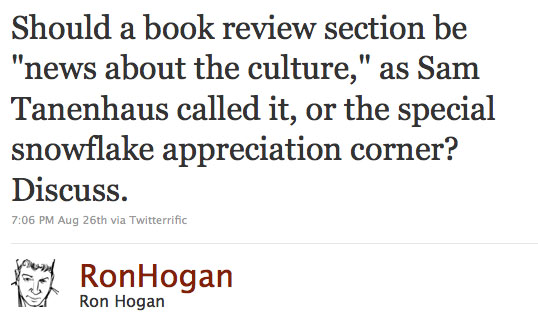Franzenfreude Is Only the Tip of the Iceberg

Jonathan Franzen’s new novel, Freedom, isn’t even out yet, and already it’s become one of the most talked-about novels of the year—although, if truth be told, for the last week people have actually been talking more about how much people have been talking about Freedom than they’ve been talking about the novel itself. Let me explain: Jennifer Weiner, who also has a new novel out this summer (Fly Away Home), pointed out that the folks who run the book coverage at The New York Times sure do love them some Franzen, based on the number of articles they’ve written about him and his book, and she noted that this attention (which she called “Franzenfreude”) is just the latest manifestation of the Times tendency to dwell obsessively on Great White Male Novelists—I can’t recall offhand if she used specific examples, but she could certainly have cited the ways in which, after the publication of I Am Charlotte Simmons, the Times became, as I put it, “the newspaper that cried Wolfe,” or their fixation on John Updike after the publication of Terrorist, as examples. Soon after Weiner’s remarks, Jodi Picoult reinforced the message with a tweet that said, in part: “Would love to see the NYT rave about authors who aren’t white male literary darlings.”
It’s not surprising that much of the media coverage has tried to frame the resulting argument as “women who write bestselling commercial fiction take out their resentment over a lack of critical respectability on a literary man,” but there’s a lot more to this situation than mere personality conflict. Weiner and Picoult, among others, are giving us a valuable critique of a serious problem with the way the Times—and, frankly, most of the so-called literary establishment—treats contemporary fiction. Which is to say: They ignore most of it, and when it comes to the narrow bandwidth of literature they do cover, their performance is underwhelming, “not only meager but shockingly mediocre,” as former LA Times Book Review director Steve Wasserman said three years ago. And it hasn’t gotten any better since then, leaving us with what Jennifer Weiner describes as “a disease that’s rotting the relationship between readers and reviewers.”
Back in 2007, quoting Morrissey, I elaborated upon what I saw as book reviewers’ fatal inability to stay in touch with America’s real literary culture, as opposed to the one they wish existed: “Too many readers have come to the conclusion that the music they constantly play says nothing to them about their lives.” A few months later, I went into more detail about what I meant:
“Book reviewers didn’t manage to lose a significant chunk of their newspaper audiences, not to mention in many cases the confidence of their management, because people couldn’t remember how important book reviewing was to the upkeep of civilization. Far from it. To the extent that readers have chosen to devalue book reviewing, they have done so because (a) a number of book reviewers stopped being interesting to them and (b) other people, who were judged to actually have something meaningful to say about books, arose to take their place—first online and then, the way things are going, in the mainstream media as well. The way to keep book coverage up isn’t to wag your finger at readers and insist “[books] need to be sifted for the public, to see what matters”—it’s to get better and more creative at talking about books and the culture they sustain.”
That’s one of the things I believe most passionately about the real “book culture” that’s continuing to flourish despite the establishment’s refusal to take it seriously—but that doesn’t mean that I think book reviews are doomed to be the way they are. To quote Weiner one more time: “Instead of asking which books and which authors deserve the Times’ coverage, maybe we should think about what kind of book review section readers deserve.” She then goes on to dream about what that book review section would look like:
“A great book review section should have something for every reader, whether it’s the fourteen-year-old who stood in line for Mockingjay, the Oprah-watching housewife who can’t wait to get her hands on Freedom, the guy (yes, they’re out there) who loved Jodi Picoult’s The Tenth Circle, and the guy who picked up Steig Larsson after not reading a novel since college and needs to know where to go next.
A great book review section should have something for the new mom who loves Elizabeth Berg and Susan Isaacs and Sophie Kinsella, and my mom, who reads J.M. Coetzee and Amos Oz and David Ebershoff. It should speak to my friend who loves Margot Livesy and my friend who reads Chelsea Handler.”
All I really have to add to that is: Yes. Well, I could expand just a little: When he took over the New York Times Book Review a few years back, Sam Tanenhaus declared that he wanted the section to exemplify “news about the culture,” but, as I said back when the Times was still working through its man-crush on Tom Wolfe, “it’s a big culture out there,” and if the people who purport to be telling us about it won’t brush up on their fieldwork, we’re going to find some new social scientists.
30 August 2010 | theory |

 Our Endless and Proper Work is my new book with Belt Publishing about starting (and sticking to) a productive writing practice.
Our Endless and Proper Work is my new book with Belt Publishing about starting (and sticking to) a productive writing practice. 
